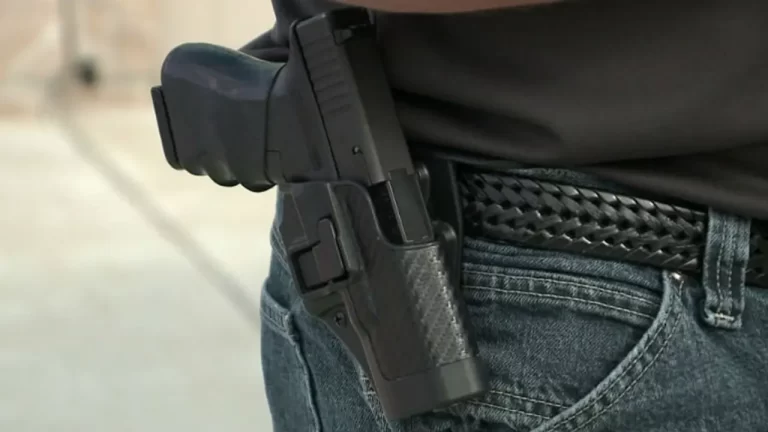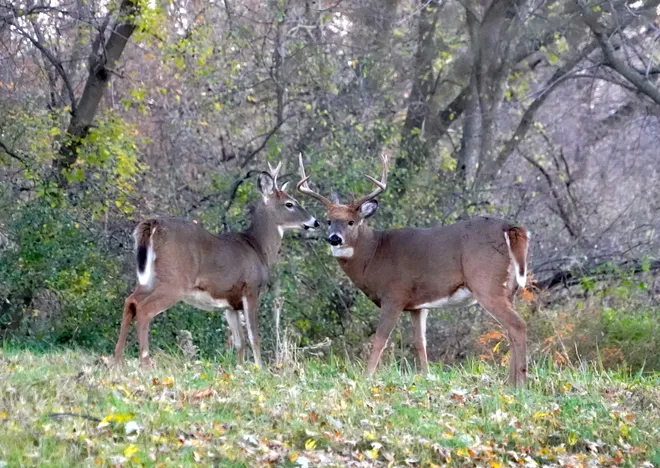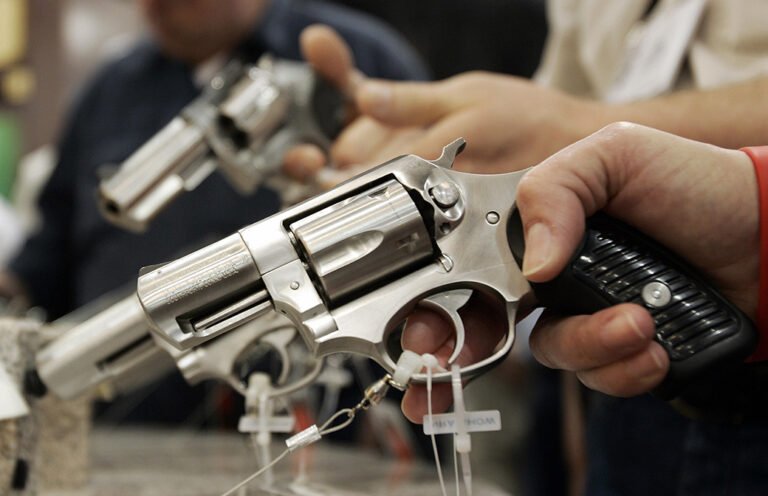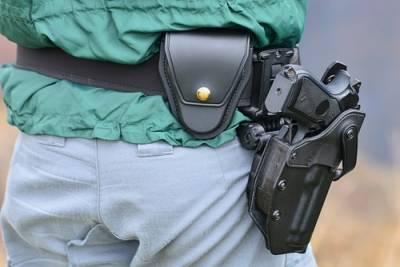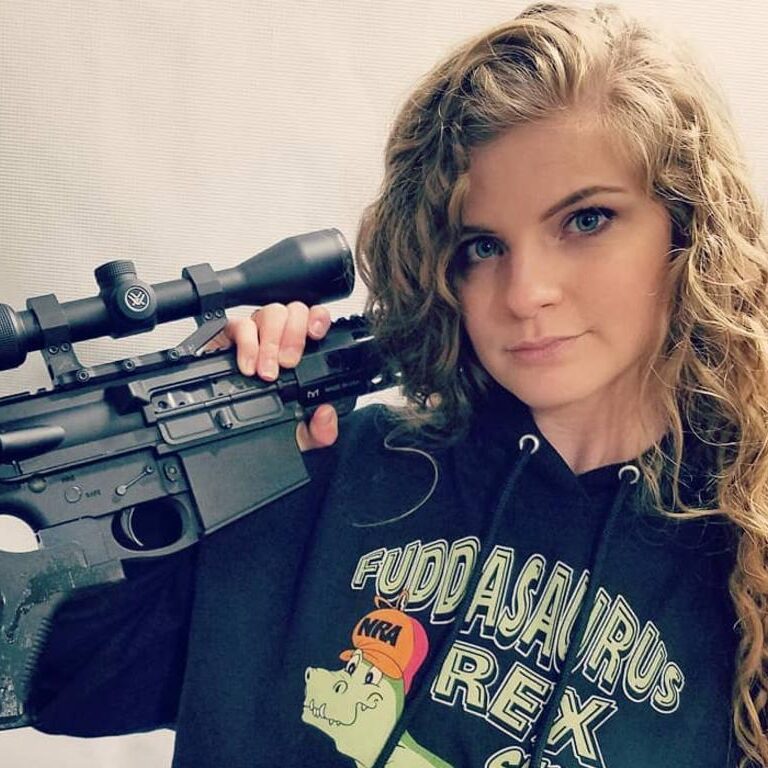Wisconsin Gun Laws
Wisconsin, with its rich history and diverse landscapes, is known for many things. One of the topics that often sparks discussion is its concealed carry laws. In this article, we will delve into the intricacies of Wisconsin’s concealed carry reciprocity, exploring the various aspects of this legal framework. From its population to the states it honors and the places where concealed carry is allowed, let’s take a comprehensive look at Wisconsin’s stance on concealed carry.
Introduction
Wisconsin’s approach to concealed carry is a subject of interest for both residents and those from other states. With a population of over 5.8 million people, the state has established specific regulations regarding who can carry concealed weapons and where.
Wisconsin’s Concealed Carry Landscape
Population Snapshot
Wisconsin boasts a population of approximately 5.8 million residents. This significant population plays a role in shaping the state’s concealed carry policies.
Constitutional Carry Status
While some states embrace constitutional carry – allowing individuals to carry firearms without permits – Wisconsin is not among them. The state requires permits for concealed carry.
Licensing Statistics
Wisconsin has issued licenses to over 398,000 individuals, reflecting the strong interest in concealed carry within the state.
Carry Permits and Reciprocity
Honoring Other States’ Permits
Wisconsin extends its recognition to concealed carry permits from other states, provided the permit holder is at least 21 years old. This reciprocity agreement facilitates the legal carrying of concealed weapons across state lines.
Reciprocity List
Wisconsin honors concealed carry permits from 33 states. However, there are certain states with restricted reciprocity, allowing for carry under specific conditions.
Restricted Reciprocity
States like Alaska, Arizona, Colorado, Michigan, Oklahoma, Pennsylvania, Tennessee, Texas, Utah, Virginia, West Virginia, and Wyoming have restricted reciprocity with Wisconsin. This means that while there is some reciprocity, certain conditions or restrictions apply.
States Not Honoring CCW
Unfortunately, not all states reciprocate Wisconsin’s concealed carry permits. California, Connecticut, Delaware, Hawaii, Illinois, Maryland, Massachusetts, Minnesota, New Jersey, New Mexico, New York, Oregon, Rhode Island, South Carolina, Texas, Washington, and Washington D.C. do not honor Wisconsin’s CCW permits.
Honoring These States CCW Permits
Wisconsin, on the other hand, honors concealed carry permits from a wide range of states, including Alabama, Arkansas, Florida, Georgia, Idaho, Indiana, Iowa, Kansas, Kentucky, Louisiana, Michigan, Mississippi, Missouri, Montana, Nebraska, Nevada, Ohio, South Dakota, Tennessee, and Utah.
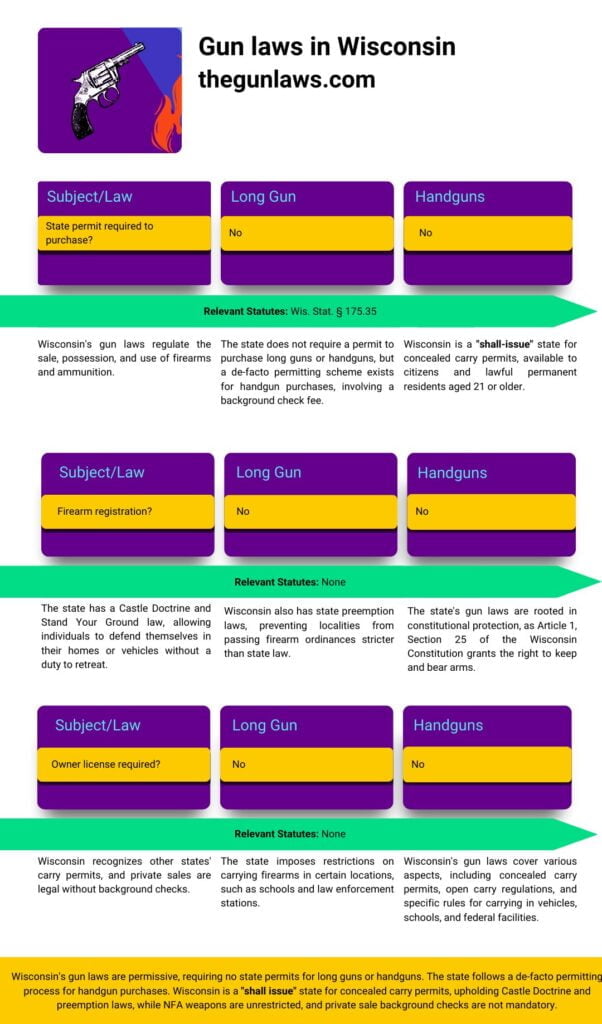
Understanding Reciprocity in Wisconsin
Age Requirement
To be eligible for concealed carry reciprocity in Wisconsin, the permit holder must be at least 21 years old. This age threshold aligns with the state’s commitment to responsible firearm ownership.
Reciprocity Mechanics
Reciprocity between states allows individuals with valid concealed carry permits to legally carry their firearms across state lines. Wisconsin adheres to this principle, providing permit holders with the ability to exercise their rights beyond the state’s borders.
Additional Resources
For more information on concealed carry reciprocity and related regulations, individuals can refer to Wisconsin’s official state website. This valuable resource offers comprehensive insights into the nuances of the state’s concealed carry laws.
Where Concealed Carry Is Permitted
Wisconsin’s concealed carry laws outline several areas where individuals can legally carry concealed weapons:
- State Parks and Forests: Concealed carry is permitted within state parks, national forests, and state wildlife management areas, allowing individuals to enjoy the outdoors while exercising their Second Amendment rights.
- Roadside Rest Areas: Concealed carry is also allowed at roadside rest areas, providing travelers with the peace of mind that comes with self-protection.
- Vehicles: Wisconsin recognizes the right to concealed carry within vehicles, provided the individual holds a concealed weapons license or a permit from a state with reciprocity.
Restricted Areas and No-Carry Zones
While Wisconsin’s concealed carry laws grant certain freedoms, there are specific areas where carrying firearms is prohibited:
- Law Enforcement Facilities: Buildings housing police stations, sheriff’s offices, and state patrol stations are designated as no-carry zones.
- Correctional and Mental Health Facilities: Prisons, jails, secure mental health facilities, and other related institutions are restricted areas for concealed carry.
- Courthouses and Airports: Courthouses, both county and federal, along with secured areas in airports, are off-limits for concealed carry.
- School Grounds: Carrying concealed weapons within 1000 feet of a school is prohibited, ensuring a safe educational environment.
- Federal Prohibitions: Areas, where federal law prohibits the carrying of firearms, are also considered no-carry zones.
Concealed Carry Laws in Wisconsin
Open Carry Regulations
Wisconsin allows open carry without a license for individuals who are at least 18 years old and legally allowed to possess a firearm. This provides an avenue for responsible firearm owners to visibly carry their weapons, complying with the state’s Weapons Laws.
Carrying in Vehicles
A Wisconsin Supreme Court ruling clarified that individuals must have a valid permit to carry a concealed handgun in a vehicle. However, if no permit is present, carrying a handgun in a visible manner, above the window line, is permissible.
State Park and Forest Carry
Individuals are permitted to carry concealed firearms in state parks, national forests, and state wildlife management areas, provided they have a valid concealed weapons license or a permit from a reciprocal state.
Carry in Restaurants
Wisconsin allows concealed carry within restaurants and bars for individuals with a concealed weapons license or a permit from a recognized state. However, it is crucial to refrain from carrying firearms while intoxicated.
Wisconsin Gun Laws for Out-of-State Visitors
Out-of-state visitors to Wisconsin over age 18 can legally open carry without a license but concealed carry requires a Wisconsin concealed carry license.
Constitutional Carry and No Weapon Signs
Constitutional Carry Status
Although Wisconsin does not fully embrace constitutional carry, it permits open carry without a license. However, for concealed carry, a permit is required.
Enforcing No Weapon Signs
Wisconsin gives legal force to “No Weapons” signs, and individuals must respect these signs on private properties or businesses. For the signs to be enforceable, they must be at least 5″x 7″ in size and clearly indicate the type of gun and carry that is prohibited.
Interaction with Law Enforcement
Wisconsin is not a duty-to-inform state, meaning individuals carrying concealed weapons do not need to disclose this fact to a police officer unless specifically asked. However, if requested, individuals must provide a truthful response and present their license and photo ID.
Conclusion
Wisconsin’s concealed carry reciprocity and gun laws reflect its commitment to responsible firearm ownership while ensuring public safety. Understanding the state’s regulations is essential for both residents and visitors who wish to exercise their Second Amendment rights within Wisconsin’s borders.
FAQs;
Q1. How old do you have to be to obtain a concealed carry license in Wisconsin?
Individuals must be at least 21 years old to be eligible for a concealed carry license in Wisconsin.
Q2. Can I carry my concealed handgun in state parks?
Yes, Wisconsin permits concealed carry in state parks and other designated outdoor areas.
Q3. Are there any places where concealed carry is prohibited in Wisconsin?
Yes, carrying concealed firearms is prohibited in certain areas, including law enforcement facilities, correctional and mental health facilities, courthouses, airports, and school grounds.
Q4. Is Wisconsin a constitutional carry state?
No, Wisconsin is not considered a constitutional carry state as it requires permits for concealed carry.
Q5. Do I need to inform a police officer if I am carrying a concealed weapon?
No, Wisconsin is not a duty-to-inform state, but if asked, individuals must provide truthful answers and present their concealed carry license and photo ID.
Here are 2 sentence summaries for each of your Wisconsin gun law questions:
Q6. Can you carry a gun in Wisconsin at 18?
In Wisconsin, 18-20-year-olds may legally carry firearms without a license but must be 21 to concealed carry.
Q7. Can you carry a gun in Wisconsin without a license?
Wisconsin allows permitless open carry for residents and non-residents, but you must have a license to concealed carry.

